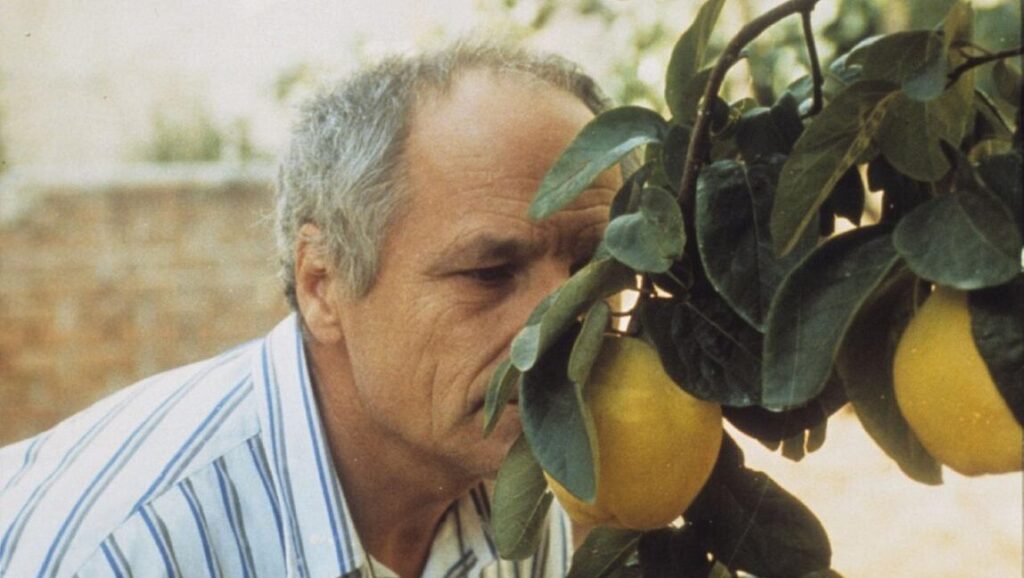With the 2020 Cannes Film Festival shuttered in the wake of the ongoing global COVID-19 pandemic, the spring festival’s storied history is once again on the minds of cinephiles across the globe. A festival well over 70 years old, it’s become the most prestigious festival on the annual calendar, with its award winners often defaultly pushed into the global cinema conversation regarding a respective year’s best offerings. And yet, history is a different story, and some of these works become lost to it. Take, for example, the final feature film from legendary director Victor Erice — The Quince Tree Sun (or Dream of Light). The film is best billed as one in a long lineage of docu-fiction hybrids, a mode of cinema that has evolved artistically and gained traction with audiences in the years since. The Quince Tree Sun’s deceptively simple narrative introduces viewers to painter Antonio Lopeź García, a man who attempts to paint the gorgeous, titular flora that grows in his yard. As time passes, changes afflict the tree: its form changes and its fruits become heavy with rot and fall to the ground. The subsequent winter brings a temporary death followed soon by a rebirth. The tree is surrounded by a web of strings and weights intended to give the painter an advantage over the always changing tree, acting as relational signposts marking the last stroke he made on his canvas, with varying degrees of success. As the film progresses, the viewers’ witness of this process becomes increasingly pervaded by the daily goings on of Garcia’s wife (herself an artist whose own painting becomes something of a stinging revelation near the film’s end), as well as an encroaching war in the Middle East. And, of course for any film so indebted to the creative method, the painter’s friends and contemporaries stop by throughout in order to muse on the artist, the artistic process, aging, and time.
Isolationary in many senses, the film is a gorgeously rendered portrait of man’s, sometimes bleak, contemplations, but here it’s formed less as miserablist meditation and more as something akin to balm, a baptism of sorts for viewers
Shot with profound intimacy and a quiet hand, The Quince Tree Sun can superficially be described as a “documentary,” sure, but what makes the film so breathtaking nearly 30 years on is not its subtle neo-realism. Rather, Erice’s almost Malickian interest in the metaphysical is what stirs. Whereas the enigmatic Texan finds beauty in the spiritual, Erice’s view is less guided by any belief structure and is more concerned with the inescapability of time’s passing. Long shots capture Garcia painstakingly trying to fight the inevitable dissolution of his subject, all while he finds himself staring down the final act of his life. This is in many ways Erice’s The Tree of Life, as The Quince Tree Sun is less interested in Garcia’s painting of his tree in any literal sense than he is in its symbolic potential for his views on life, death, art and time. Garcia tries to skirt Sisyphean ends, to capture a specific moment in his and this tree’s life before they both pass, yet within seconds a light can shift, a fruit could fall or a storm could come. Erice seems to be interrogating the very notion of meaning: in life, in art, in process, in the impossible.
Its relevance to our current quarantine state may not be readily apparent, but the context actually feels fitting. Rarely ever leaving the confines of Garcia’s home, The Quince Tree Sun is a film both interested in cosmic-sized questions and one that operates on a profoundly intimate scale. It’s a film built on the literal passage of time on screen, and while it came nearly 30 years before the COVID-19 pandemic, it feels strangely in conversation with our bewildering present. Isolationary in many senses, the film is a gorgeously rendered portrait of man’s, sometimes bleak, contemplations, but here it’s formed less as miserablist meditation and more as something akin to balm, a baptism of sorts for viewers who have, in 2020, been forced to experience time’s passing with more freedom and less surety than ever before. And while there’s no prophecy to be found in Erice’s work, it’s a testament to its universal truths and questions that The Quince Tree Sun stands as one of cinema’s great explorations of time and our unfixed place within it.
Part of Kicking the Canon – The Film Canon.


Comments are closed.